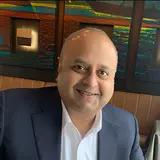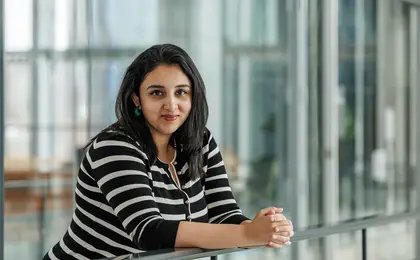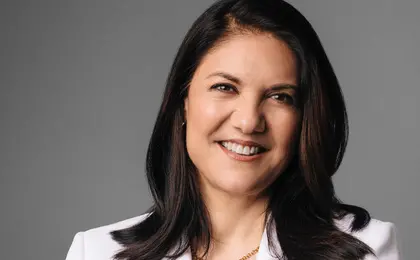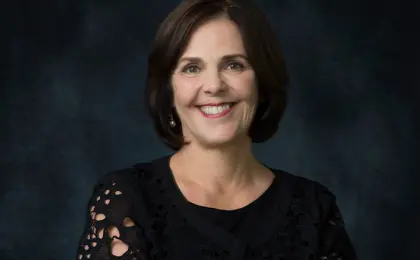
Vikram Wagh ’04
MBA
Chief Executive Officer, Mahindra Tractors and Gromax Agri Equipment
By Rebecca Beyer
If life is two mountains, one that must be climbed to attain career and material success and another that represents personal fulfillment, Vikram Wagh ’04 says he is on his second ascent.
“The second mountain is what you want to do,” he says. “I feel that now. I’ve felt that for a few years now. I run a large company, and that’s fine, but today I’m most fulfilled talking to young people. That’s the future.”
Wagh has been able to combine personal and professional fulfillment in his latest concurrent roles as chief executive officer of Mahindra Tractors—the world’s largest tractor company by volume—and Gromax Agri Equipment, a small company owned by Mahindra and the Indian state of Gujarat. He is chairperson of the Agriculture Skill Council of India, an initiative under the aegis of the Government of India to train and provide opportunities to rural youth. Last year, Mahindra piloted a program in which it opened 10 training centers across India to help train, upskill, and reskill workers associated with farm mechanization. The program, which continues to expand, aims to address several concerns: Mahindra’s ability to recruit good candidates, a lack of opportunity in rural areas in India, and the employment prospects of India’s young people.
“We said, ‘Let’s kill two birds with one stone—let’s train people and give them opportunity and get the people our industry needs,” Wagh explains. “That’s part of doing well and doing good.”
Wagh studied chemical engineering at Bangalore University and then earned a graduate degree in marketing from the University of Mumbai in 1990. He worked for several years at a German chemical firm and as a consultant helping companies enter the newly liberalized Indian market before deciding to study abroad in the United States. It was a risky move—Wagh had a wife and young son—but Wagh’s mother had recently died of cancer, and he felt a sense of urgency.
“[Her death] came as a shock,” he remembers. “That’s when it hit me: Life is short. I really need to do something different.”
Yale SOM stood out for its small class sizes and its emphasis on training leaders who could excel in both business and society. Wagh says he particularly enjoyed classes with the late Professor Sharon Oster and with Stanley J. Garstka, now professor in the practice emeritus of management, whom he calls a mentor and friend.
Yale “pushed me out of my comfort zone in a very nice way,” he remembers. “I always thought I was smart. But, when I went there, I was totally humbled. There were so many people who had done so much more at a younger age.”
In one course, Wagh remembers playing a game in which one player makes a one-time offer to split $100 with another player. If the second player rejects the offer, neither gets to keep the money. He says he sees echoes of that lesson, and its requirements of trust and partnership, in the sustainability efforts he is involved in through his work.
“Whenever I’m in doubt, I go to the basics I learned at SOM, and I’ve never been disappointed,” he says.
Wagh says his SOM degree “fast tracked him” through the next phase of his career. He landed a job through an on-campus interview with construction materials company Lafarge (now Holcim), eventually heading operations in India. Next, he joined construction equipment company JCB, where he helped the company grow its excavator business and ultimately served as managing director for southeast Asia based out of Singapore.
In 2021, Wagh joined Mahindra, based out of Mumbai. In his dual role at Mahindra and Gromax, he helps helm a large global company and a smaller local one.
Mahindra “is the largest tractor manufacturer in the world,” he says. “When you take a risk, you better be damn sure of what you’re doing. Gromax is more like a speedboat. We can pivot and turn and try different things. It’s very exciting.”
Mindful of the role that Yale SOM played in his career path, Wagh returned to Yale in October to talk to students. In New Haven, he says, he first began to understand the concept of combining career success with a positive impact. His experience as a student raised his expectations for himself and others.
“‘This is where the bar is now,’” he remembers thinking. “In my class, we had people who wanted to do investment banking and people who wanted to eliminate poverty. And that’s a singularity, not a duality. You have to do well and you have to do good. That’s the only way to sustain ourselves.”
Related Profiles

Shreya Arora ’25

Mary Ellen Iskenderian ’86

